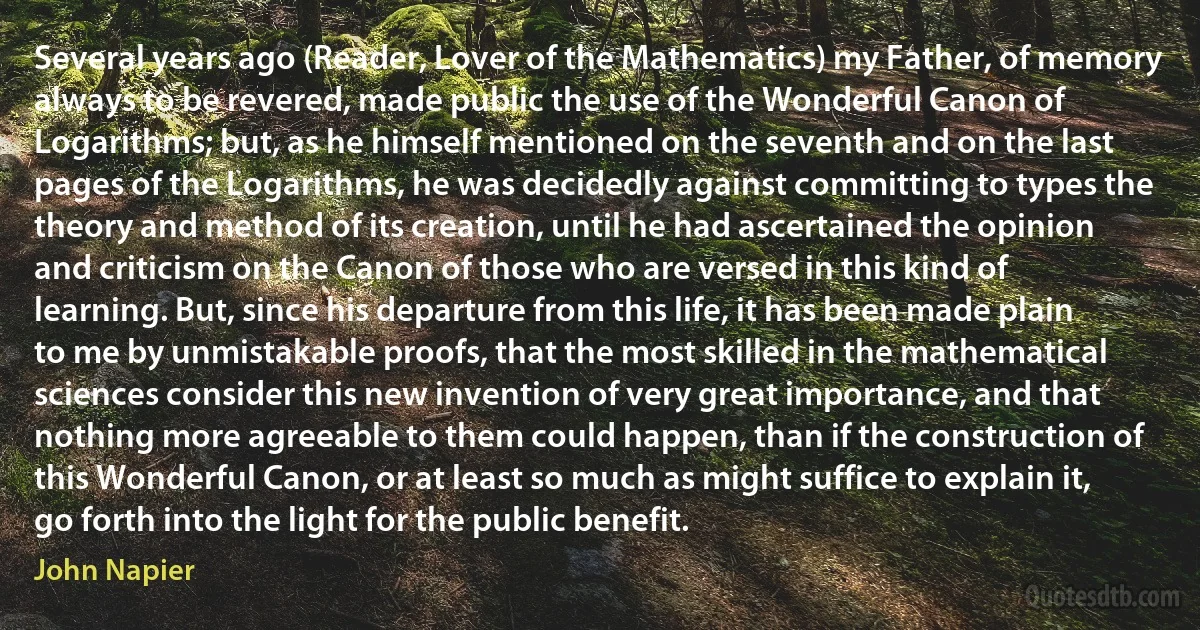
Several years ago (Reader, Lover of the Mathematics) my Father, of memory always to be revered, made public the use of the Wonderful Canon of Logarithms; but, as he himself mentioned on the seventh and on the last pages of the Logarithms, he was decidedly against committing to types the theory and method of its creation, until he had ascertained the opinion and criticism on the Canon of those who are versed in this kind of learning. But, since his departure from this life, it has been made plain to me by unmistakable proofs, that the most skilled in the mathematical sciences consider this new invention of very great importance, and that nothing more agreeable to them could happen, than if the construction of this Wonderful Canon, or at least so much as might suffice to explain it, go forth into the light for the public benefit.
John NapierRelated topics
benefit criticism father forth great kind last learning least life light lover mathematics might memory nothing opinion plain public seventh use years sciencesRelated quotes
The science of the age, in short, is physical, chemical, physiological; in all shapes mechanical. Our favourite Mathematics, the highly prized exponent of all these other sciences, has also become more and more mechanical. Excellence in what is called its higher departments depends less on natural genius than on acquired expertness in wielding its machinery. Without undervaluing the wonderful results which a Lagrange or Laplace educes by means of it, we may remark, that their calculus, differential and integral, is little else than a more cunningly-constructed arithmetical mill; where the factors, being put in, are, as it were, ground into the true product, under cover, and without other effort on our part than steady turning of the handle. We have more Mathematics than ever; but less Mathesis.

Thomas Carlyle
P. Bernays has pointed out on several occasions that, since the consistency of a system cannot be proved using means of proof weaker than those of the system itself, it is necessary to go beyond the framework of what is, in Hilbert's sense, finitary mathematics if one wants to prove the consistency of classical mathematics, or even that of classical number theory. Consequently, since finitary mathematics is defined as the mathematics in which evidence rests on what is intuitive, certain abstract notions are required for the proof of the consistency of number theory.... In the absence of a precise notion of what it means to be evident, either in the intuitive or in the abstract realm, we have no strict proof of Bernays' assertion; practically speaking, however, there can be no doubt that it is correct...

Paul Bernays
Don't forget that God sees you and watches you when you are in pain; He perceives even the beating of your heart. Consequently, He will not leave you without consolation and His fatherly protection. Naturally, the saints rejoiced in their afflictions; as for us, let us at least manage to accept affliction or pain patiently.
My child, pray within your heart, and the name of Jesus will become for you a comforting balm so that you can bear this trial of yours in a way which benefits you. You will greatly benefit from this trial if you submit yourself to it patiently. So again I say to you, with the almighty armor of prayer continually approach the omnipotent Lord more often, and you will come to know how He wondrously lifts the burden of pain and marvellously gives rest to sufferers.

Ephraim of Arizona
WHAT HAPPENS AFTER DEATH?
When a human soul goes out of the body, some great mystery happens. For if it is guilty of sins, then there come hordes of demons, evil angels and dark forces, take that soul and drag it to their side.
No one should be surprised at that, because if a man surrendered and fell prey to them while still alive in this world, will not they have even greater control over him and enslave him when he departs from this world?
As for the other, the better part of people, something different happens to them. There are Angels around the holy servants of God in this life; the holy spirits surround them and protect them; and when their souls are separated from the body, the choir of Angels welcomes them into their fellowship, into a bright life, and thus leads them to the Lord.

Macarius of Egypt
A great many individuals ever since the rise of the mathematical method, have, each for himself, attacked its direct and indirect consequences. ...I shall call each of these persons a paradoxer, and his system a paradox. I use the word in the old sense: ...something which is apart from general opinion, either in subject-matter, method, or conclusion. ...Thus in the sixteenth century many spoke of the earth's motion as the paradox of Copernicus, who held the ingenuity of that theory in very high esteem, and some, I think, who even inclined towards it. In the seventeenth century, the depravation of meaning took place... Phillips says paradox is "a thing which seemeth strange"-here is the old meaning...-"and absurd, and is contrary to common opinion," which is an addition due to his own time.

Augustus De Morgan
